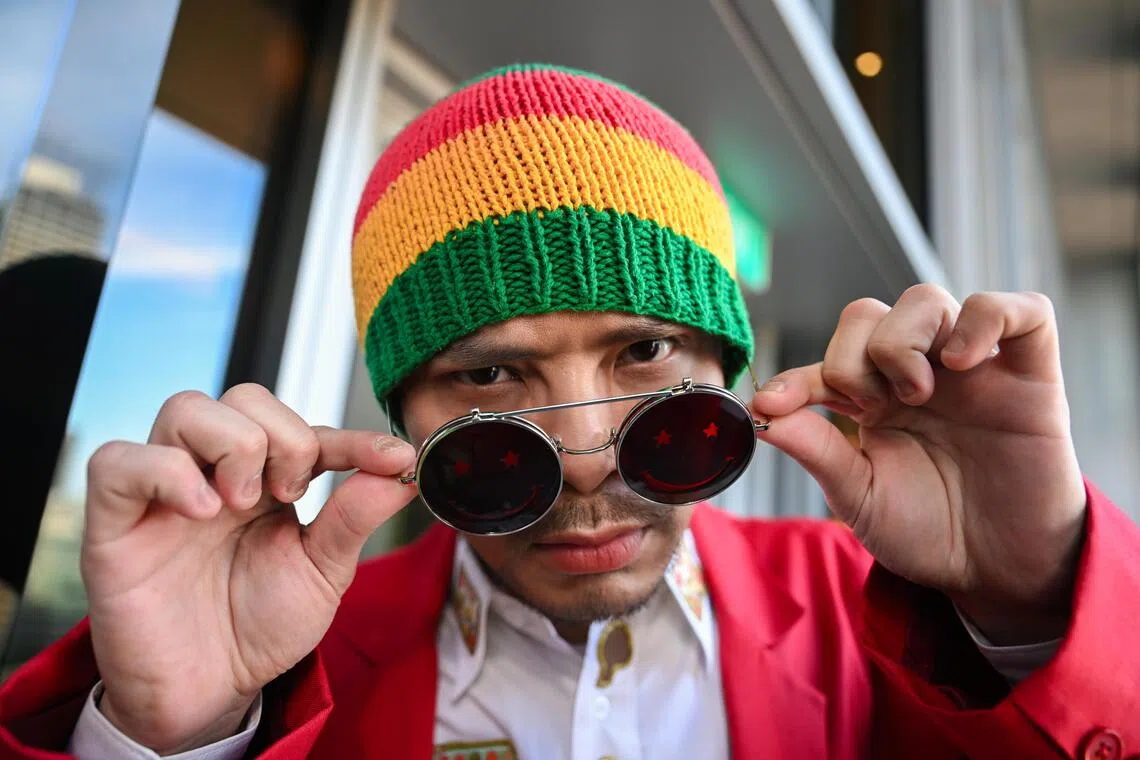Rapper, film-maker, entrepreneur: Johor-born Namewee is never too far from controversy
Sign up now: Get insights on the biggest stories in Malaysia

Namewee, known for his expletive-laden songs, has also been acknowledged for his vocal productions.
ST PHOTO: AZMI ATHNI
Follow topic:
Namewee, the multi-hyphenated Malaysian, who was detained by the police on Nov 5 for investigations into the death of Taiwanese influencer Iris Hsieh, has never been too far away from hitting the headlines.
Here are a few things to know about the exploits of the 42-year-old singer-songwriter, film-maker and entrepreneur.
Namewee moniker
Namewee, whose real name is Wee Meng Chee, took up the stage name because of how his Chinese name sounds. Meng Chee or Ming Zhi in Mandarin is a homonym for name (or ming zi in hanyu pinyin).
Johorean who started his career in Taiwan
He was born in Muar, a town in Johor where his parents still live. In an unabashed style he has come to be known for, Wee penned an expletive-laden song Muar Mandarin in tribute to his hometown and its associated quirks.
Wee went to a Chinese independent school in Malaysia, where the certification awarded is not applicable for admission to local public universities, leading him to pursue his tertiary studies in Taiwan’s Ming Chuan University.
He has written and spoken about the perceived unfairness, but said he made peace with the idea of returning to contribute to Malaysia through what he learnt abroad.
Music awards
While he has caught attention for his rapping and singles that ranged from the controversial Fragile (Glass Hearts) to the cute Japanglish tune Tokyo Bon, Wee has also received recognition for his vocal abilities.
He was awarded Best Duet Song by Taiwanese radio station Hit FM for Fragile (Glass Hearts) which he performed with singer Kimberly Chen, a song that took aim at China’s Little Pink internet brigade and got him banned from Weibo.
Wee was also twice nominated for Best Mandarin Male Singer by Taiwan’s prestigious Golden Melody Awards.
His song Stranger In The North (Piao Xiang Bei Fang) is a hip-hop duet which he wrote and recorded with singer Wang Leehom without meeting the Taiwanese-American star. The song’s video is Wee’s most popular one on YouTube with more than 200 million views. It also won multiple awards including Best Original Score from the European Cinematography Awards
Wee’s versatility across musical genres has also seen him collaborating with artistes like Mandopop star Jam Hsiao, Hong Kong singer G.E.M and Taiwanese rock duo Power Station. He has also attempted to bring attention to places and performers from Thailand, Vietnam, and Taiwan’s Kinmen Islands through his compositions.
He showed a softer side with his song Mother that featured his own mum on vocals, with the pair crooning about their life in Muar and his laments about causing her to worry over his legal troubles. They performed the song onstage in his hometown, where he joked that he forgot the lyrics in parts while she sang off beat.
Brushes with the law
Wee has been questioned or detained by the police in Malaysia multiple times before the Nov 5 arrest, but mostly for his artistic productions.
His first controversial release was a homemade version of Malaysia’s national anthem Negaraku in 2007, which featured his self-penned lyrics about the country’s civil service and cultural quirks, and led to him being questioned under the Sedition Act.
In 2024, a court found him guilty of defaming Malaysian concert organiser Star Planet, when he accused it of having a hand in the cancellation of one of his concerts in 2019. He was ordered to pay damages to the company and its managing director, as well as issue an apology, both on video and in print media.
In 2016, Wee was arrested and remanded for four days in a Penang prison, after being accused of making a music video that defiled places of religious worship. He later released a different version of the video for the song Oh My God which omitted previous depictions of a mosque.
In an interview with The Straits Times in 2024
“I just want to be myself: easy-going, carefree and not held hostage by expectations,” he said.
Film forays
Wee is also a film-maker. In 2011, he directed and starred in Nasi Lemak 2.0, a film he said was intended to celebrate Malaysia’s multiculturalism but was met with protests over its depiction of certain facets of race and religion.
Police reports were also lodged in 2020 against another film he directed, Babi, which tackled school violence but was accused of portraying elements of racism.
Songwriter, director, hotelier
Apart from his musical and theatrical pursuits, Wee is also a hotelier, having set up the 4896 hotel in Dannok, a town bordering Malaysia in southern Thailand, in 2024.
The project, a joint venture with a friend, was designed with an American retro cinema theme, Wee said, and aimed at contributing to a region where tourist numbers were decimated after the Covid-19 pandemic.
To market the hotel, whose name 4896 sounds like very powerful in Hokkien slang (si pek kao lat), Wee played to his strengths and released a song Dannok. He invited guests to “criticise boldly” where needed so the hotel could satisfy them with their services.


